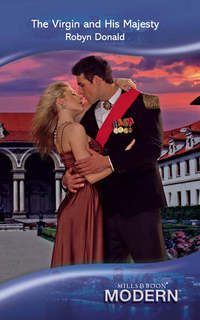
Полная версия
Indiscretions
“I’m fine,” she said steadily. “Just tired.”
He made a swift sound of irritation. “You haven’t had dinner, have you?”
“I had a substantial snack before drinks. I’m not in the least hungry,” she told him, hoping that her words convinced him. If anyone presented her with food she might well throw up, because her stomach was churning with something that definitely wasn’t hunger.
His expression unreadable, he looked keenly into her face. “I’m sorry,” he said. “That was totally inconsiderate of me. I’ll order you a bar meal.”
Something of her revulsion must have shown in her face, for before she could answer he said autocratically, “Then I’ll see you to your room.”
She shook her head. “I sleep in the staff quarters, a hundred yards or so away.”
“I’ll see you there.”
“Mr. Leigh—Nicholas—there is no need. The security here is watertight.”
“My mother,” he explained calmly, “would never forgive me. She had few rules, but those she had were cast in iron and drummed into me as a child. One of them was that when you’ve bought a drink for a woman you see her to her door. And you should know by now that security is never watertight.”
Mariel cast him a wary, exasperated glance. Although he was smiling there was a determination in his expression that told her it was no use; this man would do what he wanted regardless of how she felt.
“Very well then” she said coldly, walking out before him.
The staff who lived on-site were housed in the old stables, which had been converted into a neat complex behind the main hotel. At the end of a wide pathway that curled away beneath magnolia and live oak, the old brick building was sheltered behind a low wall. Between the hotel and staff quarters was a formal garden, where beds of azaleas bloomed beneath the still flowerless branches of crepe myrties. It was April and, while winter had barely loosened its grip on New York, here the night air was cool, but the days were warm and getting warmer.
“A pretty setting,” Nicholas said, looking around.
Pretty? Compared to some of the quarters Mariel had slept in, the compound was palatial! “The owner’s husband is a keen gardener,” she said quietly.
Perhaps Nicholas Leigh was right; perhaps she did like her creature comforts too much. Surely anyone who’d been brought up in comparative luxury, then faced at the age of eight with a sudden descent into poverty and austerity, could be excused for enjoying such beautiful surroundings.
The gentle hush of waves on the beach backgrounded Nicholas Leigh’s voice as he said, “This reminds me a little of Auckland. The same scent—salt and flowers and green growing things.”
“And humidity?”
“You don’t like the Auckland climate?”
She shrugged. “I’ve never lived there.”
“And you never want to.” He let that sink in before asking, “Is it just Auckland you dislike or New Zealand as a whole?”
The words were delivered mildly, but she felt the taunt as clearly as though he’d snarled at her. “There’s nothing for me there now,” she said dismissively, glad they had reached a door of the middle block. “This is as far as you are allowed, I’m afraid,” she said, and held out her hand.
“I’ll see you tomorrow,” he said, smiling narrowly.
She shivered, wincing at the spark of electricity that flashed between them again, fierce and fathomless. It took willpower to retrieve her hand without jerking it from his.
“It’s a damned nuisance, isn’t it?” he said almost conversationally. “However, I’m sure we’re both strong-minded enough to resist it.”
She stared at him.
“Don’t pretend you don’t know what it is.” An oblique smile barely disturbed the corners of his mouth. “You felt it the moment I did.”
“I did not!” And then, because her indignant response had given her away, she said angrily, “Look, I’m not interested—”
“You challenged me,” he said with a forbidding curtness, “and you knew you were doing it. I could be tempted to take you up on it, but I don’t think it would be sensible.”
There was contempt in his voice, contempt, she realized, directed not only at her. Nicholas Leigh saw this attraction as a weakness and despised himself for it.
Wordlessly she turned, her emotions perilously close to the surface, and slipped through the door, closing it behind her. His frankness had shocked her, and yet a dangerously capricious part of her heart thrilled, because he, too, had no defense against the overwhelming intensity of that physical reaction.
Damn, she thought, Nicholas Leigh was turning out to be a real threat to her peace of mind. Fortunately she was only here for four days.
Nothing could happen in four days.
As she took out her room key, Elise hurried past. “Have you seen Caitlin?” she demanded.
Mariel brought her head up sharply. There had been a real note of fear in the woman’s voice. “No. Why?”
“Oh, God. I’ve looked and looked and looked for her, but she’s not here. One of the housemaids said she saw her hanging around outside. I think she might have run away.”
“Run away?”
Elise drew in a deep breath and calmed down. “To her father. I’ll have to go and look for her.”
“Just wait a moment while I change my shoes and I’ll come and help.”
Mariel came back outside in time to hear Elise say in carefully controlled tones, “Yes, honey, I know you don’t like living here much, but we have to stay here for a while.”
Caitlin’s voice, the whine not entirely hiding her real un-happiness, floated on the humid air. “If you let my daddy come back, we could live in our old house.”
“Oh, darling, we can’t ever go back.”
“We can go and live with him!” Caitlin shouted. “He said so. I heard him. I don’t want to live here, I want to go to California to live with Daddy.”
Mariel hesitated, then, her heart aching for them both, went into her room. Poor Elise was going to have to deal with this herself.
BY THE TIME she arrived at the main building the next morning, the New Zealand interpreter had been shipped out. Mariel was told by Liz Jermain that she was to do whatever was required of her.
After stashing her computer in the business center, she walked briskly along to the room that had been set aside for the delegation to breakfast in, and suffered with as much composure as she could the introductions Nicholas Leigh made. Mr. McCabe, the trade minister, received her with professional affability, and the aides and various other underlings accepted her presence without much comment. Susan Waterhouse gave her a cool nod. Peter Sanderson watched her with an avidity she found both irritating and upsetting.
The morning, she discovered as Nicholas handed her a cup of coffee, was to be spent on the golf course, and as the Japanese interpreter was busy with documents she was on duty.
Nicholas was also a member of the golfing group. He played well, she decided acidly, keeping her eyes away from the controlled line of shoulder and thigh, the smooth skill and grace with which he swung. He certainly had excellent rapport with the Japanese trade minister and his aides, one of whom asked Mariel if she played.
“I’m afraid not,” she said, meeting Nicholas’s eyes without a blink. She most emphatically did not want to displays her mediocre golfing skills in such company.
“A pity,” the man said, smiling.
From then on she took care to stay as far out of the way as she could. She didn’t need the attention.
Nevertheless, the fact that the New Zealand trade minister spoke no Japanese at all meant she had to be close by all the time. Indeed, she found the morning intriguing. The ministers and their aides discussed almost everything but the subject of free trade, which was what had brought both parties here.
Obviously these were just the preliminaries during which each party sized up the other.
Why was she needed at all when Nicholas spoke fluent Japanese, and the Japanese minister equally fluent, if heavily accented, English? Protocol, probably, and the desire not to lose face, and also because a lot could be riding on these preliminaries.
After lunch they spent several hours with the ministers and their cohorts on the rifle range. Nicholas was there, too; he shot well. No doubt he did everything well, she thought, firmly squelching an image of him making love, that lean body poised over hers…
Heat shimmered through her, sweet as honey, draining her of energy and common sense.
“No,” she muttered, earning herself a startled look from a small, exquisitely dressed Japanese gentleman.
“I wonder what other sports they intend to try?” she said, smiling.
He bowed. “I believe we ride horses,” he said politely.
“Oh.” She shrugged. “I don’t ride,” she said.
“Neither do I.”
They smiled at each other.
Golf had at least been comparatively quiet, and the links were beautiful—if one excepted the occasional alligator lurking in the ponds. And they were quiet. In spite of the earmuffs they all wore, the rifle range was noisy. Riding, however, threatened to be painful. She was wondering cynically whether she could claim danger pay when Nicholas said, “Clay pigeons next.”
Starting, because he’d come up behind her, she met his mocking eyes directly. He couldn’t possibly have recognized her boredom because she was an expert at hiding it, so he was just taunting her, seeing how she’d react.
I’ll fix him, she thought, and gave him a dazzling, excited smile before obediently accompanying the group to yet more fusillades of noise.
When at last they stopped shooting and returned to the hotel, she had several discussion documents to translate and type while everyone else went to their rooms. Grateful for the reprieve from one particular man’s company, she made for the office.
“At least I have reasonable hours”, Elise said with commiseration, looking up from her work as Mariel got up and stretched her fingers and back.
“Oh, I get paid well for it. How’s Caitlin today?”
“All churned up. I honestly don’t know what I’m going to do with her.” The older woman put down the sheets of paper she was sorting and pressed her fingertips to her forehead, smoothing out the frown lines toward her temples. “She swears she’s going to run away to her father. Says he’s going to come and meet her.”
Mariel asked tentatively, “Could he be putting ideas in her head?”
“Not as far as I know,” Elise said. Looking away, she said bitterly, “She got so upset after he called her the first few times that I told him I wouldn’t let her talk on the phone to him anymore because she was unbearable afterwardtan trums and yelling and then crying fit to break her heart.”
Preventing any communication at all didn’t seem to Mariel to be a good idea, but after a glance at Elise’s bleak face she held her tongue. Elise knew her daughter.
The older woman said abruptly, “She still cries in the night and says she’s going to see him soon. She misses him, I guess.”
“Is she going to spend the holidays with him?”
Elise’s mouth clamped shut. “He can’t look after her. He’s getting a new business off the ground—he’s got no time to spend with her. He only sued for custody to teach me a lesson for daring to leave him. It’s so typical of him to just go bullheaded for what he wants and never give a thought to how his actions affect anyone else.”
“Is he fond of her?”
Elise shrugged. “Yeah, he’s fond of her. He even says he loves her, but if loving means you want the other person’s happiness above your own, Jimmy’s only ever loved himself. The counselor said Caitlin just doesn’t know how to deal with the fact that her daddy’s left her, so she blames me for it. She hates me working, but she’s quite happy staying after school with Saranne Beamish in the village. She likes Saranne’s kids. Sometimes I just don’t know what to do.” Her eyes filled with tears.
“A marriage breakup is always hard on the children, but they get over it,” Mariel said soothingly.
From behind came a man’s voice, deep and cool and curt. “Have you finished those documents, Mariel?”
She jumped, but not as high as Elise, whose audible gasp sounded loudly in the room.
“No,” Mariel said, turning swiftly to shield the older woman from Nicholas’s too-observant eyes.
“We need them now,” he said.
She nodded. “I’ll bring them up to Mr. McCabe when they’re done.”
“Thank you.”
After he’d left, Elise said, “God, he’s gorgeous, isn’t he? But his eyes send shivers down my spine. I wouldn’t like to get on the wrong side of him. Jimmy only bruised my heart. That guy could scar you for life.”
“I’m sure he’s not violent,” Mariel said, shocked.
“There are different sorts of violence,” Elise said wearily. “I don’t think Tall-dark-and-handsome’s cruel by nature, but I’ll bet he could be if he was provoked enough. You’d better get on with that work.”
The documents were broadly based, without specificsmere lists of suggestions. After translating them, Mariel took them up to the minister’s suite, where she read them through to him, Nicholas and a couple of other men. The older one she recognized with a clutch of foreboding to be a senior diplomat, now retired, whose speciality was Asian affairs. Although he would have known her parents, he showed no signs of identifying her.
That evening each mission was eating separately, no doubt discussing tactics, so her services weren’t required. After dinner and a swim in the pool, she spent a couple of hours or so in her room trying to relax, but the shadowy phantoms of her past pressed closer and closer, robbing her of any hope of rest, let alone sleep.
Finally she gave up the effort and crossed to her window and looked out. The moon hung half-blown in the sky, shedding a pale, hazy sheen over the grounds; lights blazed forth from the hotel, but although the paths were still lit by fairy lamps, no one trod between the trees.
She chose tan slacks and a cool cream T-shirt, slipped a soft cream-and-tan sweater over her shoulders and pulled espadrilles onto her feet, then walked outside, wondering just what restless compulsion drove her into the scented darkness.
Urged on by something primal and heartfelt, an unknown goad, she headed toward the beach, remembering other beaches she’d seen, other coasts, other seas far removed from this—seas that beat against rockbound coasts in Norway, seas that lapped blinding coral sands in turquoise lagoons off Fiji, the wild west coast of New Zealand where waves had half the world to gather and build before they fell savagely onto the cliff-bound rim of land.
Odd that New Zealand should come to mind when usually she avoided all thoughts of it.
Well, no, not odd; the image of a face, all aggressive angles, and a lean, disciplined body that moved with predatory grace had been hovering just behind her eyes ever since she’d first seen Nicholas Leigh.
Even as she shivered he appeared, coalescing out of the darkness on the edge of the woods, his head turned to watch her arrive. Not for a moment did she mistake him for anyone else; she had the unsettling feeling that he had brought her there, called her with a primitive, magical lure that had nothing to do with the mundane.
He didn’t make any of the usual greetings. As though he had expected her, he held out his hand, and as though he had the right, she gave him hers, this time braced for the jolt of pure awareness that raced through her at his touch.
“You can’t see the Southern Cross from here,” he said.
“So?”
She caught the quick flash of white as he smiled.
“I was born under the Southern Cross,” he said. “I hope to die under it one day.”
“Born under it literally?”
“Literally. My parents were sailing when I arrived, too suddenly for them to get back to land. My mother insisted on being on deck. My father said that I looked at the sky as I was born.”
Fascinated, she said, “Perhaps you were imprinted like a baby bird.”
He laughed softly. “Perhaps. Where were you born, Mariel?”
“In Kashmir,” she said, and gave a startled little laugh. “Oddly enough, on a houseboat. I was a month premature.”
She kept her eyes on the beach that spread out before them, white in the vaporous moonlight, but she felt his gaze, keen and piercing as a lance of crystal. It kindled an untamed exultation because his reaction was written in his features, and it was just as helpless, just as wild, as hers.
“So you were born on a boat, too.”
“Quite a coincidence.” Following his lead, she strove to sound matter-of-fact, repressing the astounded excitement that made her feel her whole world was tumbling, racing, shattering, and all she could call on to protect her were the small weapons of her character and willpower.
“A sign, do you think?”
Her attempt at a laugh was blocked somewhere in the region of her heart. “Of what?” she asked. “Careless parents?”
Beneath the amusement in his answering laugh prowled an elemental possessiveness that sent a shiver down her spine. “Perhaps,” he said. “A link, anyway.”
And because she couldn’t allow this, couldn’t let him forge connections between them, she said briskly, “Well, both events occurred a long time ago. I’m more interested in the present. Tell me, what happens tomorrow morning? Any possibility of a few exchanges of opinion about trade or barriers or tariffs? I thought they’d be settling into earnest discussions by now.”
“Let’s sit for a while,” he suggested, turning off the hard-packed strand onto the soft powdery sand by the low dunes.
Relieved, she removed her hand from his to sit down, and by doing so felt that in some symbolic way she’d regained a fraction of her autonomy.
Perhaps recognizing the small declaration of independence, he didn’t attempt to touch her; instead, he leaned back and looked at the stars. “This is just a preliminary sortie. It’s possible that nothing important will actually be discussed this time.”
Although he’d followed her change of subject, Mariel detected a note of indulgence in his words, as if he had consciously decided to allow her a breathing space.
“Then why are you all here?” she asked. “This holiday is costing each country a fortune, and all the ministers are doing is running around showing off to each other!”
His smile was brief and ironic. “Both of these men are new to their jobs—they haven’t met before. As they’re going to be working together, it will make things much simpler if they understand how the other thinks.”
“So that’s why all the macho posturing,” she said with exasperation. “Golf and target shooting. Honestly, when are you men going to give over the world to women and spend all your time playing your childish games without having the affairs of the world hinge on them? That way you wouldn’t do nearly so much damage.”
To her astonishment he laughed again. “Oh, I agree heartily, but diplomacy is conducted along different lines.”
With eyes adjusted to the night, Mariel looked at him shrewdly. “You don’t sound as though you buy into the ethos.”
His smile remained, the amusement in his expression didn’t alter, but she knew as plainly as if she’d seen it that her words had struck some hidden tender spot.
“I’m a diplomat, so I must,” he said evenly. “I agree it can be slow and sometimes infuriating, but often it works. Building a personal bridge can help.”
Recognizing the evasion, she decided to pin this irritatingly elusive man down. “What exactly is your part in all this posturing?”
“My area of expertise is trade.”
Of course, he was a diplomat, and they were experts at avoiding the issue. “So what,” she demanded, “beyond finding out that Mr. Watanabe is the better golfer and Mr. McCabe the better shot, do any of you expect to learn from this expensive exercise?”
“I don’t expect to learn anything,” he said calmly. “I am a mere cog in the wheel, the lowliest of the low.”
She laughed, she couldn’t help it, the sound clear and low and warm in the salty air. “You don’t look the sort of man to indulge in mock humility,” she retorted.
“Mock humility I can manage,” he assured her. “I have been told that the real stuff is beyond me.”
A note in the deep voice snagged her attention. Whoever had told him that had been a woman. Stung, she said mordantly, “I believe it,” as she got to her feet.
With the automatic courtesy she was beginning to expect, he rose, too. In the shifting veils of moonlight his eyes glinted, and she thought with a sudden chill that trading insults with this man could be a dangerous pastime.
“I’d better go back,” she murmured.
“Ah, yes, I’d forgotten that you’re not expected to mingle with the guests.”
“Well, the resort doesn’t pay me to sit around discovering the inner workings of the diplomatic mind,” she retorted crisply.
“Don’t they allow you time off?”
“Of course they do, but I’m still on the other side of the divide.”
“Are you an employee?”
He’d have found out all about her before recommending that she take the other interpreter’s place, so why the questions? She sent him a swift sideways glance, but his face was unreadable.
“No, free-lance. An agency in New York organizes my jobs for me.”
“And you enjoy your work?”
“Love it,” she said firmly.
“You’re extremely good at it. You have both McCabe and Watanabe eating out of your hand.”
How did he do it? He wasn’t even looking at her, yet her skin pulled tight and she had the unnerving sensation of being totally, completely scrutinized—absorbed, taken in, everything about her measured and assessed.
“They both have a charming, old-fashioned courtesy,” she said dryly.
“The Japanese say you speak their language like a native.”
To satisfy his probing curiosity she said serenely, “When I lived in Tokyo my parents sent me to a Japanese school. In a situation like that you learn fast, believe me. Of course, the year I spent back in Japan when I was eighteen helped refine my accent.”
“And did you live in China and France as a child?”
She smiled, striving so hard for a casual unaffected air that her throat ached. “Hong Kong,” she said. “And for a while I had a French governess who was forbidden to speak English to me.”
“Peripatetic parents”, he said, his lashes drooping to hide his thoughts.
“Very,” she returned steadily. “Nomads”.
Just how nomadic their life had been she hadn’t realized until she went back to New Zealand, a shocked, bewildered eight-year-old plunged into the narrow, restrictive society of a small, unsympathetic country town. Two things had saved her—a kindly neighbor who provided her with uncritical affection, and an extremely good language teacher at the local high school who had seen her talents and helped her regain the languages she had almost lost.
“If I’m to be any good tomorrow I’d better go now,” she said, infusing her voice with a brisk, no-nonsense tone.
“Very well, then.” He sounded amused, as though he recognized her retreat but was prepared to allow her to run from him for the time being, because the result was never in doubt.
CHAPTER THREE
HE WAS TOO BLOODY ARROGANT for his own good, she thought confusedly as she paced along the sand beside his tall presence.
As they were crossing the low band of scrub and palmettos that bordered the beach, something rustled in the bushes. Nicholas moved instantly, sidestepping swiftly so that he was between her and the noise.
“It’s nothing,” she said, surprised. “Perhaps a squirrel.”
“There are snakes here.”
She laughed. “And like all New Zealanders you’re paranoid about them. Don’t worry, the night is cool enough to keep them fairly lethargic. It’s not likely to be an alligator, either. They prefer the golf course. It could be a raccoon.”
His eyes gleamed as he looked down at her. “Snakes don’t worry you?”








